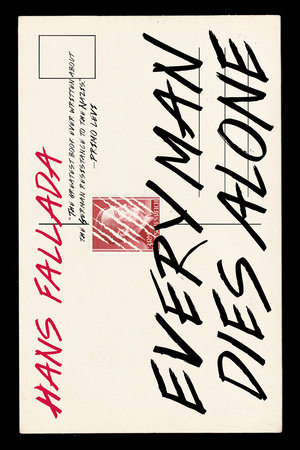READERS GUIDE
When Melville House translated Hans Fallada’s
Every Man Dies Alone book into English for the first time 15 years ago, The New York Times called it “A signal literary event,” and “a visceral, chilling portrait of … everyday German life during the war.”
Based on actual Gestapo files, the story follows a working-class couple in Berlin who decide enough is enough, and commit to a desperate underground resistance campaign against the brutal Nazi regime. This sweeping saga of resistance is more relevant than ever in modern times, with the rise of right wing rhetoric echoed in global politics, and seen in increased book bannings and the reversal of women’s’ and LGBTQ+ rights in the US.the Nazi regime.
In the end, this special, limited edition of Every Man Dies Alone continues to be more than an edge-of-your-seat thriller, more than a moving romance, even more than literature of the highest order — it’s a deeply stirring story of two people standing up for what’s right — even against impossible odds.
Questions and Topics for Discussion
- In what way does the apartment house at 55 Jablonski Strasse represent Berlin society as a whole? Do the occupations and character of the residents and their placement in the building reflect power or class structures within German culture at the time?
- Hans Fallada brilliantly creates an atmosphere of fear: each character is afraid of something different. What are these differences? What role does fear play in controlling and motivating each character? How does the specific fear based on the murder of Jewish people affect and motivate the main characters?
- Although Inspector Escherich is a Nazi, is he meant to be a sympathetic character? Does his character change? What brings about that change? How does his suicide affect his character arc?
- Much of the novel is about fractured families. How does Fallada use the condition of the family to express the condition of the society?
- Enno Kluge is a shirker and a gambler, and behaves apprehensively in some instances. But he seems motivated more by laziness and selfishness than inherent evil. What do you think Fallada meant to represent with this character and his fate? How is Enno different from his some-time colleague Emil Borkhausen?
- Anna Quangel seems to draw strength from her husband. How does she also provide him with strength? Towards the end of the novel, Anna seems to be transformed by her love for her husband. What do you think Fallada means by this transformation? Do you think Anna’s end is merciful? Why?
- When we first meet Otto and Anna Quangel we have the sense that their relationship is static. Does their relationship change over the course of the novel? How does it change? Is Every Man Dies Alone a love story?
- Fallada seems to set up a dichotomy between the country and the city. Why do you think he places the final, redemptive scene in the countryside, after staging the overwhelming majority of the book in Berlin?
- For most of his lifetime, Otto preferred to keep to himself and avoid interactions with other people. In prison he is confronted with many types of people. How do these experiences change him? What do you think Fallada was trying to suggest about the nature of human relationships?
- When Otto sees the map with all the pins on it in Inspector Escherich’s office and learns that most of the postcards were turned in, he becomes distressed. Did Otto come to believe his efforts were in vain? What meaning did he and Anna find in their campaign? In your opinion, was it worth the risk?

